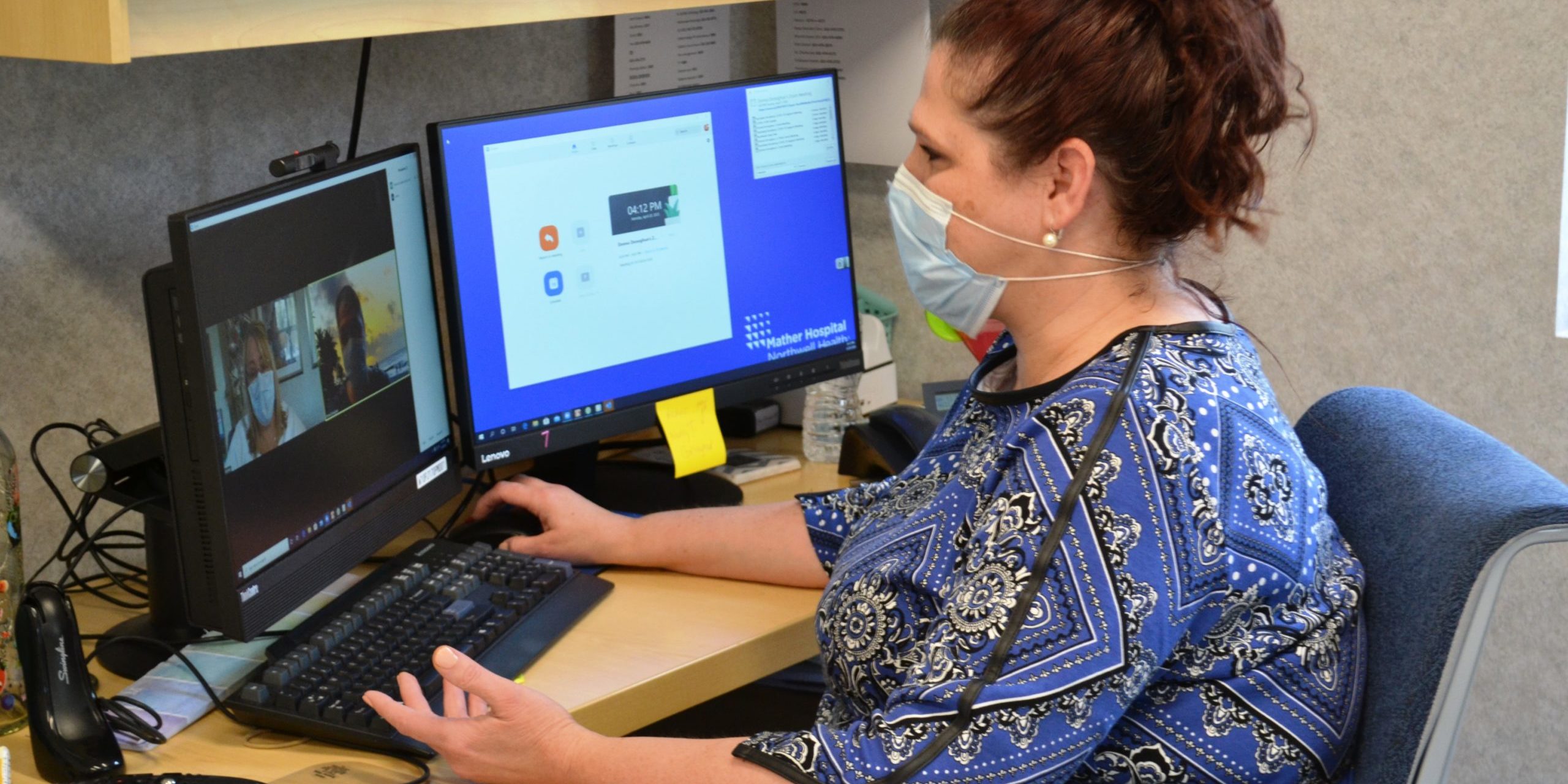When the COVID-19 pandemic made social distancing a necessity, Mather’s healthcare providers turned to telemedicine to keep in touch with their patients.
“It’s been a great thing and has given us the ability to maintain continuity of care with patients,” said Chief Medical Officer Joan Faro, MD. “Doctors who were skeptical about telemedicine are not any longer and patients are really liking it. We don’t want to lose track of our patients. We’re using Facetime, Zoom, and an application called doxy.me.”
While the hospital has two telemedicine carts being used on 3 North, she said, it is in the physician practices where the digital technology has really transformed health care during the pandemic. “Doctors don’t want patients coming to the office for obvious reasons. They want them to avoid unnecessary exposure to other patients. The patients don’t want to come either,” she said. “This is a great way to give them care in appropriate circumstances.”
Zach Chaudry, operations manager for Harbor View Medical Services, described doxy.me: “It is a secure HIPAA compliant platform that is easy to use for both patients and providers,” he said. “It can also be used from various devices and requires no downloads or complicated sign-up processes for our patients. Although the HIPAA standards have been relaxed due to the pandemic, we liked the fact that the platform is HIPAA compliant and was fairly easy to implement quickly across our practices.”
Cardiologist David Shenouda, DO, of Three Village Cardiology said he’s had a good experience with patients using the platform. “It’s much more efficient for them because they don’t have to drive to the office, fill out a bunch of paperwork and wait,” he said. “Now they just get online and they wait for us in the virtual waiting room for no more than 3-4 minutes.”
Telemedicine does have its limitations, he noted, “We need to see new patients face to face so we can conduct a proper medical exam. We’ll also see patients concerning chest pain or arrhythmia to do an EKG. If they do need to come to our office, their exposure is very limited. We bring them in right away. No one sits in the waiting room. If they must wait, they go out to their cars and we call them on their cell phones.”
Christine Fruth, DO, of Mather Primary Care, also uses doxy.me to connect with patients. “It has been working very well. It’s been relatively easy for the patients.” For those without access to a smartphone or laptop, Dr. Fruth calls to follow up on their care. Certain diagnoses such as chest pain, abdominal pain or high blood pressure still require an in-office visit, she said.
“One of the best things to come out of this is patients like to talk to their doctor about COVID,” she said. “There’s a lot of misinformation out there in the press. About 90 percent of the visits I’ve done wind up in conversations about COVID.”
Fruth believes telemedicine will continue to have value once the COVID-19 crisis abates. “It will have a role for housebound patients or for medication follow-ups, but I don’t see it replacing the face-to-face visits. Relationships aren’t built over an iPad.”
Donna Donoghue, MD, Mather’s director of psychiatry, said psychiatrists and therapists have kept in touch with patients using the Zoom app. “Psychiatry is one of the specialties easiest to do using telemedicine because you don’t need to perform a physical exam,” she said. Behavioral Health staff use the app for individual and group therapy sessions. “All the patients are at home and they call in and they see each other in the group,” she said (seen in photo videoconferencing colleagues).
Zoom therapy sessions tend to be longer than phone, she said, largely because of the social isolation resulting from the crisis. “People are just craving social interaction. People are stressed. It helps to know they’re not the only ones suffering through this.”
Cardiologist Michael Matilsky, MD, of Three Village Cardiology said he currently sees about 95% of his patients through telemedicine. “Patients feel better that they’re in contact with someone who knows them, cares about them, and can manage medications for them even if it’s not under ideal circumstances. Are they having the same experience as having someone in front of you? Of course not. There is a human aspect to providing care that transcends a video chat. People are more likely to be honest with you in your office with a closed door than they would be at home with other people walking around.”


